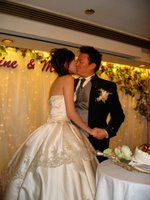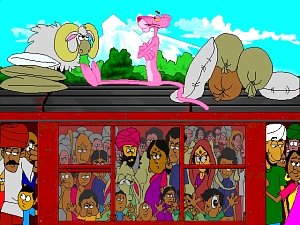11.11.
11.11 (Eleventh of November)! What kind of day worth to be celebrated?
Um..um…Independence Day in Poland or Ending WWI on the Western Front?
Though these are two important days have to remember, but what I am going to mention is another important event which was my cousin’s (Son of my father’s brother) Wedding Day on 11.11.2006 in the Regal Kowloon Hotel of Hong Kong.
I expected for his wedding for a long time, and now it was the date came that could shared his happiness in another stage of the life.
Here is a bit information about wedding's in Hong Kong:
It is included many traditions that are handed down from generation to generation in China. But depending on what province they are from in China they observe very different forms of this tradition. Also the western influence has brought about many changes. In the past it has been the Chinese custom for a boy’s parents to contact a girl’s parents by means of a mediator to arrange a marriage, before the young couple have ever met.
However, courting today in Hong Kong is usually done Western style. Nowadays when a couple who are dating decide to get married, usually the boy goes to the girl’s parents about the matter. Sometimes the boy’s parents, or in some rare cases a mediator known by both families, will intercede for the boy. During this contact between the two families the wedding details, dowry and other requirements are discussed. In these considerations the girl’s parents have the primary say.
When it is time to set the date, parents may consult a fortune-teller who may pick a “lucky day.” Or the “lucky day” may be arrived at by looking in the Chinese almanac. This is basically a book of astrology listing each day of the year and what should or should not be done on that day. “Good luck” is considered very important by both non-Christians and even members of Christendom’s religions in Hong Kong. They do everything possible to bring good luck on this special occasion. Once the wedding date is set, the bargaining starts on what might be called the bride price or dowry. The dowry usually is a set amount of money paid directly to the girl’s parents, or for a restaurant wedding feast.
The girl’s parents customarily stipulate the number of tables as well as what some of the feast courses must include, such as mushrooms, and chicken. The bride’s family may also require that a certain number of catties (pounds) of wedding cake be delivered on a “lucky day” before the wedding for distribution to friends and relatives. Usually the bargaining ends in an amicable settlement, with compromises on both sides. Sometimes, however, breaches in the relationship occur, even resulting in the calling off of the wedding. Or the in-laws may have separate feasts.
Of course, the boy’s parents are concerned about the money involved, since they often help their son to pay the dowry, and sometimes assume all the cost. After bargaining in connection with the wedding is over, there is frequently a discussion regarding what the girl’s parents are going to give the newlyweds. Sometimes it is furniture for the new home, except the wedding bed, which only the boy is to buy. If the girl’s parents are well-to-do, they may provide an apartment with the rent paid for one year, or, in some cases, paid in full.
When the wedding day finally arrives, the groom first goes to get his bride. When he arrives, friends and members of the family may not let him in unless he first pays “luck money.” This money, placed in red packets, is given to the one who opens the door or to everyone in the house. It is only after payment that the groom may receive his bride. Next, the wedding party may head to the marriage registry for the ceremony. Some people in Hong Kong, however, may want to be married on a “lucky day,” but find they are too late to get their marriage registered on that day. So they choose to have a customary Chinese wedding, and then, in the meantime, live together before having their marriage registered.
During the whole wedding ceremony on the day, I expected two things:
One is on the food: I was looking forward the food all night. Everyone was hungry because we had to wait forever while the bride and groom took photos with every possible family combination you can imagine.


(Wow...how sweet kiss after toasting to each other!!!!)
First, we got a barbecued whole suckling piggy delivered to each table. The piggy wasn’t as tasty as it looked but we were only served the crispy piggy skin, they took the piggy away. Then there was some kind of Sauteed sliced chicken and cuttlefish with vegetables, then some shark-fin soup, which was quite thick but not untasty. After that, served us some braised, sliced abalone with vegetables. Then some steamed spotted garoupa. Near the end, some rice and noodles. What a palatable dinner!
The second interesting and entertaining thing I was expected which was an emcee played some games to the bride and groom.
You see, my cousin requested to wear a RED shorts, walked around all the tables and the volunteers have to write some good lucks words or phrases on the front side and back side on his shorts. Of course, the first volunteer is his DAD.

(He looks like a superman ^_^)

My cousin’s Dad is writing the Chinese good luck words – 大吉大利.
The dinner almost finished at 11:45 p.m., I and my parents need to catch up the Jetfoil went back home, thus we had to leave a bit early. We said good bye to bride & groom and their families, wished them good luck again.
Charity Bazaar
難得在一個天朗氣清的周日, 中午約了幾位朋友去新麗華酒店的中餐廳飲茶,我們議論了一輪後, 終于決定午飯後去園游會.
甚么園遊會? 就是一年一度由明愛舉辦的慈善園遊會.
明愛是服務了社會弱勢社群有五十多年機構, 它服務澳門社會不同階層,包括安老、複康、熱線輔導、推動社區、露宿者、複康巴士、家庭問題輔導、婦女中心、托兒服務、敎育服務等,並推動社區閱讀文化,推動靑少年文化生活,協助失業人士,助養本地、南亞和內地兒童,幫助南亞水災和地震災民等。


舉辦此慈善園遊會目的是籌募年度社會服務經費. 園遊會已成為居民踴躍行善獻愛心的慈善嘉年華活動之一。今年園遊會主題為“齊喜樂,共分享”,其內容豐富, 設有各類文娛節目, 還有以各類多姿多采的攤位遊戲為主,大部分的攤位遊戲都是由那些教會學校, 慈善團契負責. 所以每年這個時間那些中學生也很花心思去設計攤位遊戲, 輿觀眾同樂. 同場還設展覽區、兒童嬉戲區、美食區及DIY區等。
在園遊會裡逗留了整個下午, 除了玩遊戲獲得些小獎品 (文具, 毛公仔, 零食,小擺設..)外, 最重要的是做了善事. 助人為快樂之本, 施比受更為有福!







